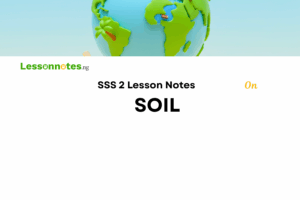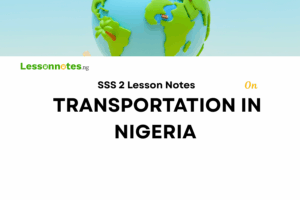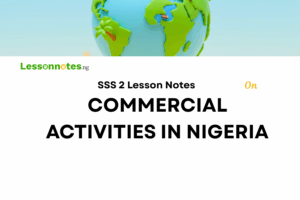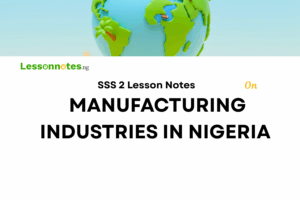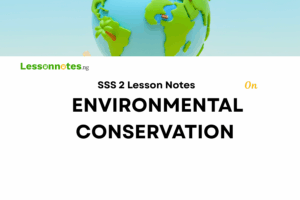Mining in Africa (Copper, Gold, and Petroleum) SS3 Geography Lesson Note
Download Lesson NoteTopic: Mining in Africa (Copper, Gold, and Petroleum)
SPECIFIC OBJECTIVES: At the end of the lesson, pupils should be able to
- Identify major mining areas of copper, gold and petroleum in Africa and explain the methods of mining them
- Explain the transportation and marketing of the minerals
- Highlight the economic importance of gold, copper and petroleum
- Analyses the problems of mining copper gold and petroleum in Africa and suggests solutions to them
INSTRUCTIONAL TECHNIQUES:
- Identification,
- explanation,
- questions and answers,
- demonstration,
- videos from the source
INSTRUCTIONAL MATERIALS:
- Videos,
- loudspeaker,
- textbook,
- pictures
NOTE
MINING IN AFRICA (COPPER, GOLD AND PETROLEUM)
Mining is the process of extracting valuable minerals, ores, or other geological materials from the Earth. It encompasses various methods and techniques to obtain resources such as metals, gemstones, and minerals.
Major mining areas in Africa for copper include the Copperbelt region in Zambia and the Katanga province in the Democratic Republic of the Congo. Gold is often mined in countries like South Africa, Ghana, and Mali. Petroleum extraction is prominent in Nigeria, Angola, and Libya.
Methods of mining in Africa
Copper is typically mined through open-pit or underground methods. Open-pit mining involves removing large quantities of soil to access the ore, while underground mining accesses deposits beneath the Earth’s surface.
Gold is mined using various methods, including open-pit mining, underground mining, and placer mining. Open-pit mining involves removing ore from the surface, underground mining accesses deeper deposits, and placer mining extracts gold from riverbeds and sediment.
Petroleum extraction involves drilling wells into underground reservoirs. Offshore drilling is common in Africa, particularly in the Gulf of Guinea. Once drilled, petroleum is extracted using pumps, and advanced technologies like seismic surveys are employed for exploration.
Transportation and marketing of copper, gold and petroleum
Transportation of minerals involves moving them from extraction sites to processing plants or marketplaces. This can be done by various means such as trucks, trains, ships, or pipelines, depending on the type and quantity of minerals.
Marketing minerals involves promoting and selling them in the global market. This includes negotiating contracts, setting prices, and complying with regulations. Marketing strategies vary based on the mineral type and market demand.
Economic importance of Gold
- Valued for its rarity, beauty, and use in jewellery.
- Serves as a safe-haven investment during economic uncertainties.
- Used in electronics, medical devices, and aerospace industries.
Economic importance of Copper
- Essential for electrical conductivity, widely used in wiring and electronics.
- Crucial for infrastructure development, including construction and transportation.
- Demand is linked to economic growth, making it a key indicator.
Economic importance of Petroleum
- Primary sources of energy are powering vehicles, and industries, and generating electricity.
- Basis for various products like plastics, chemicals, and lubricants.
- Plays a pivotal role in shaping global geopolitics due to its strategic value.
Problems of Mining Copper, Gold, and Petroleum in Africa
- Mining activities can lead to deforestation, habitat destruction, and water pollution.
- Poor management and governance can result in resource misallocation and corruption.
- Mining operations may lead to displacement of communities and human rights abuses.
- Inadequate infrastructure hinders efficient transportation of minerals.
- Dependence on global commodity prices makes economies vulnerable to market fluctuations.
- Political unrest can disrupt mining operations and create an uncertain business environment.
- Inadequate safety measures can lead to accidents and health issues for workers.
Solutions to problems of mining in Africa
- Enforcing strict environmental regulations, promoting sustainable mining practices, and investing in reclamation efforts.
- Strengthening regulatory frameworks, enhancing transparency, and encouraging community participation in decision-making.
- Prioritising social responsibility, respecting Indigenous rights, and implementing community development programs.
- Investing in infrastructure development, including roads and ports, to facilitate smooth transportation.
- Diversify the economy, invest in value-added processing, and establish stabilisation funds to mitigate the impact of price volatility.
- Fostering political stability through good governance, inclusive policies, and diplomatic efforts.
EVALUATION:
- Define mining.
- For each mineral (copper, gold and petroleum), identify their specific mining methods.
- Mention five problems of mining minerals (Copper, gold and petroleum)
- Suggest five solutions to the problems mentioned in 3 above.
CLASSWORK: As in evaluation
CONCLUSION: The teacher commends the students positively







